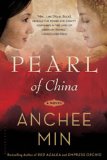Summary | Excerpt | Reading Guide | Reviews | Beyond the Book | Readalikes | Genres & Themes | Author Bio

A Novel
by Anchee Min
By the time the family crossed the Yangtze River and migrated to the south, NaiNai had given the Yee family three sons. Papa was the eldest and the only one sent to school. Grandfather expected a return from his investment. Papa was expected to become an accountant so that the family could fight the government's tax collectors. But things didn't turn out right — Grandfather lost his son to the education.
Papa believed that he was too good to work as a coolie. At sixteen, he developed the expensive habits and fantasies of the rich. He read books on China's political reform and chewed tea leaves to sweeten his peasant garlic breath. An ideal life, he told others, would be to "compose poems under blossoming plum trees," far away from the "greedy material world." Instead of returning home, Papa traveled the country, making his parents pay the bills. One day he received a message from his mother. The message informed him that his father and brothers were gravely ill and near death from an infectious disease that had swept through his hometown.
Papa rushed home, but the funeral was already over. Soon enough, his house was possessed by the debt seekers. NaiNai and Papa fell into poverty and became coolies. Although NaiNai vowed to regain their former prosperity, she was no longer healthy. By the time I was born, NaiNai suffered from an incurable intestinal disease.
Papa struggled to keep his "intellectual dignity." He continued to write poems. He even composed a piece titled "The Sweet Scent of Books" for my mother's funeral. Invoking a newfound spirituality, he insisted that his words would make better gifts than jewelry and diamonds to accompany his wife in her next life. Although Papa was no different from a beggar in terms of possessions, he made sure that he was lice-free. He kept his appearance by trimming his beard and never missed a chance to mention his "honorable past."
Papa's honorable past didn't mean anything to me. For the first years of my young life, food was the only thing on my mind. I would wake hungry every morning and go to sleep hungry every night. Sometimes the clawing in my stomach would keep me from sleeping. Having to constantly scavenge for scraps, I existed in a delirium. Unexpected luck or a good harvest might bring food for a while, but the hunger would always return.
By the time I was seven, in 1897, things had only gotten worse. Although NaiNai's health had continued to deteriorate, she was determined to do something to better our lot. Picking up her old profession, she began to receive men in the back of our bungalow. When I was given a fistful of roasted soybeans, I understood that it was time to disappear. I ran through the rice paddies and the cotton fields into the hills and hid in the bamboo groves. I cried because I couldn't bear the thought of losing NaiNai the same way I had lost Mother.
Around this time, Papa and I worked as seasonal farmhands. He planted rice, wheat, and cotton and carried manure. My job was to plant soybeans along the edges of the fields. Each day, Papa and I woke before dawn to go to work. As a child, I was paid less than an adult, but I was glad to be earning money. I had to compete with other children, especially boys. I always proved that I was faster than the boys when it came to planting soybeans. I used a chopstick to poke a hole and threw a soybean into each one. I kicked dirt into the hole and sealed it with my big toe.
The coolie market where we got our jobs closed after the planting season was over. Papa and I couldn't find any work. Papa spent his days walking the streets in search of a job. No one hired him, although he was received politely. I followed Papa throughout the town. When I found him wandering into the surrounding hills, I started doubting his seriousness about finding a job.
"What a glorious view!" Papa marveled as he beheld the countryside spreading below his feet. "Willow, come and admire the beauty of nature!"
From Pearl of China by Anchee Min. Copyright 2010 by Anchee Min. Reprinted by permission of Bloomsbury USA. All rights reserved.
Your guide toexceptional books
BookBrowse seeks out and recommends the best in contemporary fiction and nonfiction—books that not only engage and entertain but also deepen our understanding of ourselves and the world around us.